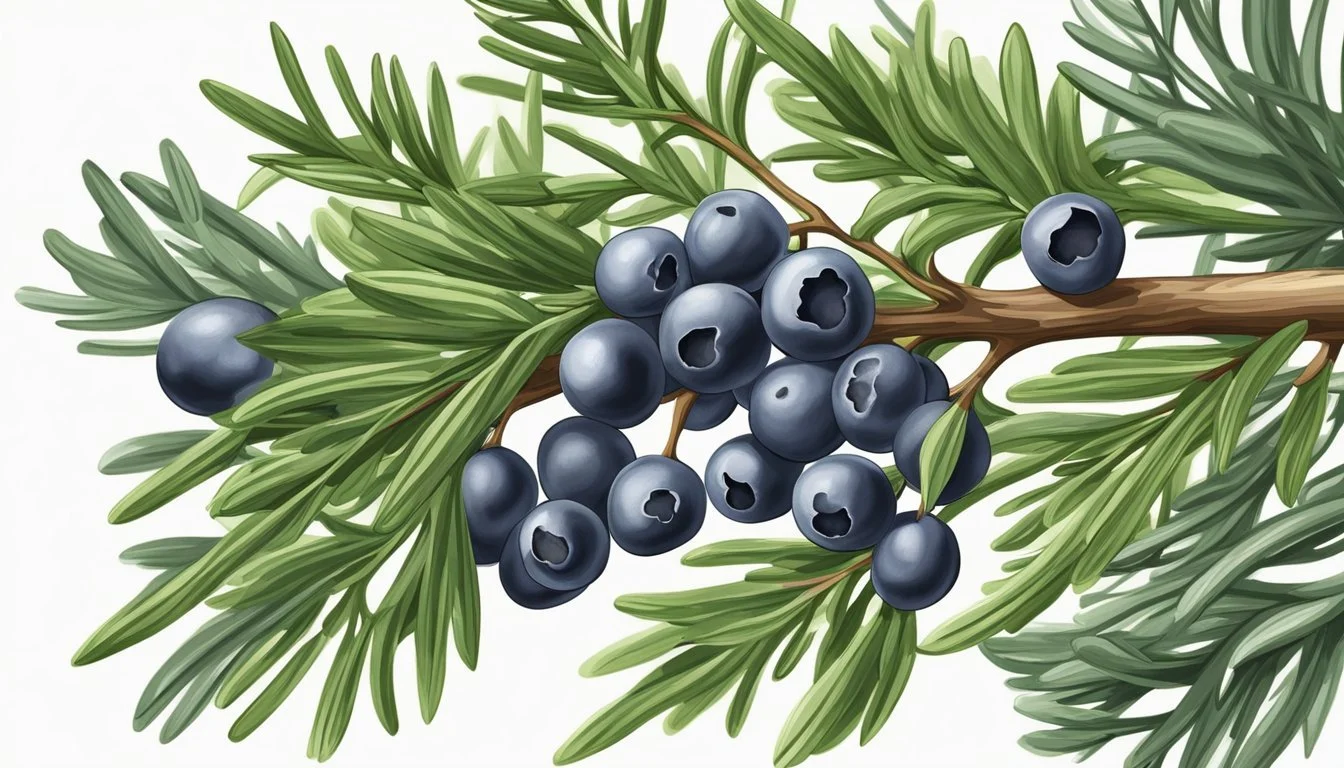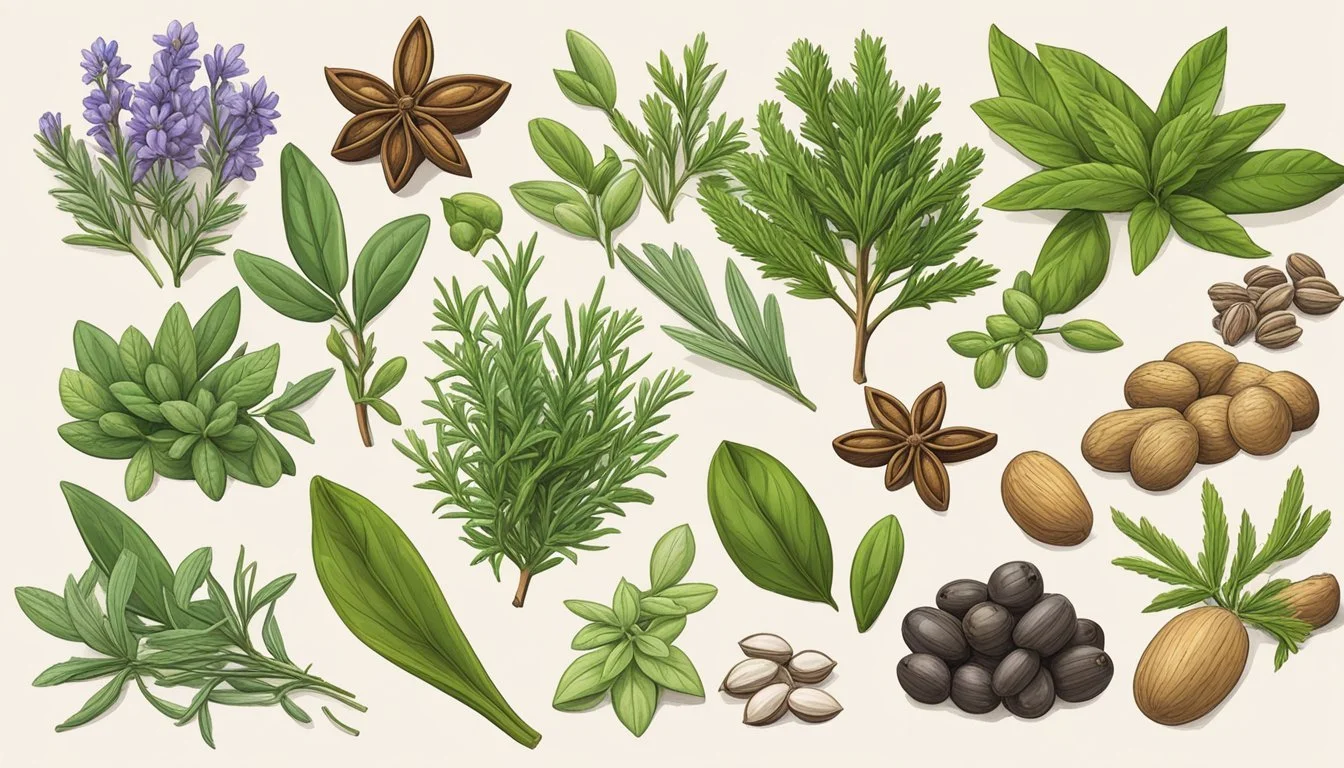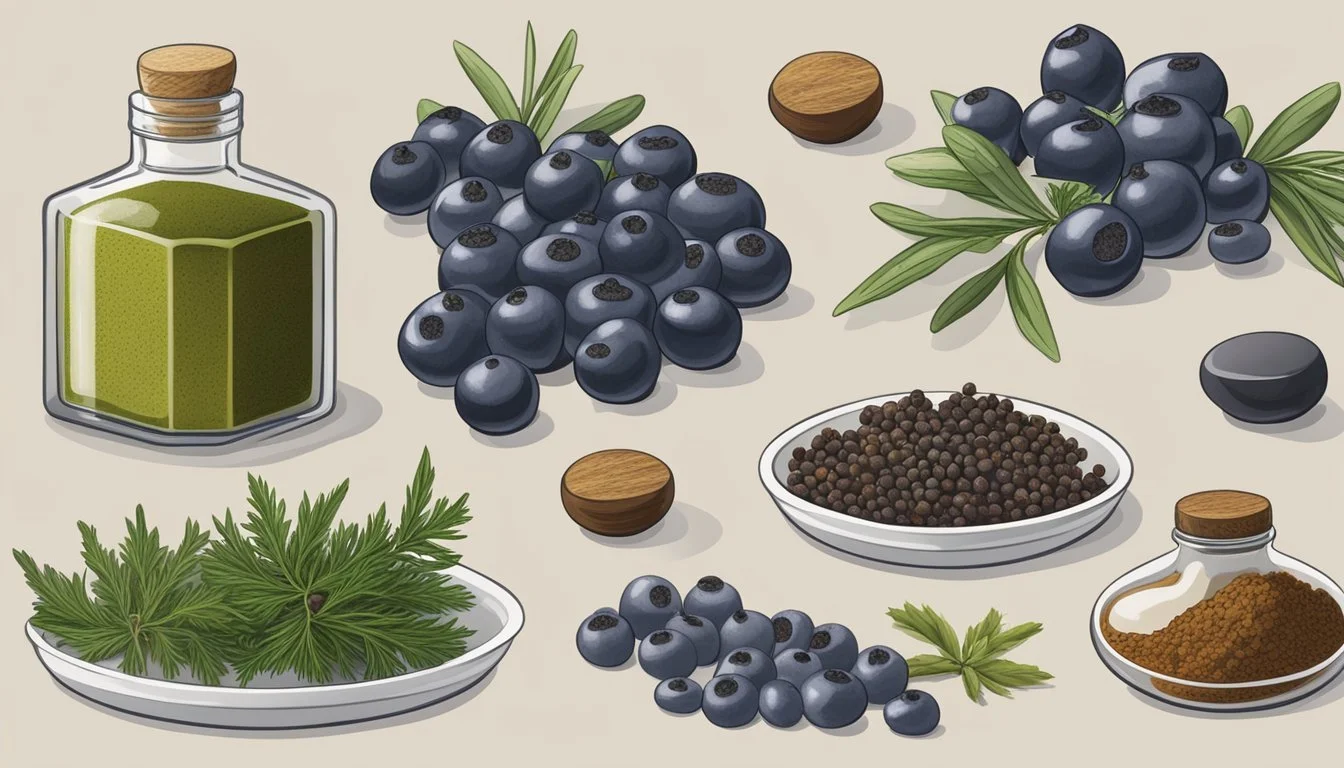Juniper Berry Substitutes
Top Alternatives for Your Recipes
Juniper berries are a distinctive ingredient, often associated with their role in flavoring gin and imparting a sharp, pine-like taste to various culinary dishes. The small, blue-hued berries contribute a slightly tart and woodsy note, which can be difficult to replicate. This distinctive flavor is crucial in a range of recipes, particularly in European cuisines where they are a traditional component in marinades for meat, game dishes, and even sauerkraut.
Finding a suitable substitute for juniper berries can be necessary for cooks who may not have them readily available or for those looking to achieve a similar flavor profile with a different twist. Various alternatives, including common kitchen spices and herbs, have been identified to mimic the flavor of juniper berries or complement the recipe's intended taste. These substitutes can range from robust, earthy spices to more aromatic and sweet herbs, offering flexibility and creativity in cooking.
Selecting the appropriate alternative requires consideration of the substitute's flavor characteristics and its interaction with other recipe ingredients. For instance, robust spices like black pepper or cardamom might be used for their pungent kick, which echoes juniper's boldness, while herbs like rosemary provide a piney aroma that closely aligns with the flavor notes of juniper berries. The aim is to achieve a balance that honors the original recipe while introducing new, harmonious tastes to the dish.
Understanding Juniper Berries
Juniper berries, the seed cones produced by various species of junipers, are known for their distinctive flavor profile. A hallmark of gin, they impart a piney flavor with hints of earthy and woody aroma. Juniperus communis is the most common species used for culinary purposes.
The berries themselves are not true berries but small, fleshy seed cones that take two to three years to mature. Upon maturation, they transition from green to a deep, blue-black hue, indicating readiness for harvest.
The taste of juniper berries is often described as both sharp and resinous, providing a pine flavor reminiscent of evergreen forests. This pungent quality is complemented by a subtle earthy flavor, which allows them to pair well with a variety of meats and dishes.
Their aroma is robust and piney, with a complexity that can elevate a dish or spirit's flavor when used judiciously. The earthy and woody aroma of juniper berries makes a significant impact in any recipe, hence their steady popularity in European cuisine and in flavoring spirits.
Common Uses of Juniper Berries
Juniper berries are valued for their strong and aromatic flavor profile, which encompass both culinary and medicinal realms.
Culinary Applications
Juniper berries have a distinctive pine-like flavor with citrus overtones, making them a sought-after spice in various cooking traditions. They are often used to impart a robust flavor to meat dishes, especially those involving game and pork. Their strong taste is perfect for enriching marinades, stews (What wine goes well with stews?), and sauerkraut, providing a depth of flavor that is hard to replicate.
Marinades: They're often crushed and added to marinades for meats.
Stews: Juniper berries can be added whole or slightly crushed to enhance the taste of stews.
Sauerkraut: A few berries are enough to add a distinct flavor to fermented cabbage dishes.
Sauces: They serve as a flavoring agent in various sauces, complementing other herbs and spices.
In addition to these uses, juniper berries are integral in certain types of alcoholic beverages. They are famously the primary flavoring in gin and can also be used in making flavor-infused cocktails.
Medicinal Uses
Traditionally, juniper berry tea has been consumed for its potential health benefits. The tea is prepared by steeping dried juniper berries and is believed to have diuretic and antiseptic properties.
Juniper Berry Tea: This herbal tea is said to support urinary tract health.
Digestion: There's a belief that juniper berries can aid digestion and alleviate gastrointestinal issues.
The medicinal uses of juniper berries should always be approached with caution, as they need to be used correctly to avoid potential side effects.
Choosing Substitutes for Juniper Berries
When looking for an alternative to juniper berries, it's important to consider how the substitute will interact with the other flavors in the dish, as well as its availability.
Factors to Consider
Availability: Not all spices and herbs are readily available in every region. Local grocery stores and spice markets may have different selections, so choosing a substitute may depend on what a person can find.
Taste and Flavor Profile: Juniper berries have a distinct pine-like, slightly citrusy taste. The chosen substitute should offer a similar flavor complexity or accentuate the existing flavors in the dish. Substitutes will not be identical, but should complement other ingredients.
Cooking Applications: Some alternatives may be better suited for certain cooking methods. For instance, dried herbs may be preferable in roasts and stews, while fresh herbs or liquids might be more appropriate for marinades and dressings.
Substitutes for Juniper Berries: Here are a few options:
Rosemary: It provides a pine-like flavor similar to juniper. One fresh sprig of rosemary can replace 4 juniper berries.
Black Pepper: Readily available and pairs well with many ingredients, providing a spicy note.
Bay Leaves: Use an equal amount of bay leaves to replace juniper berries for a similar aromatic quality.
Caraway Seeds: Their sweet and earthy taste can mimic the complexity of juniper's flavor profile in certain dishes.
Star Anise: Although distinctive, it can contribute a spicy depth similar to that of juniper berries.
When choosing a substitute, one should keep in mind the balance of the dish's flavors and how the replacement will blend with other ingredients. Each substitute comes with its own set of nuances that will alter the final flavor of the culinary creation.
Herbal Substitutes
When cooking and juniper berries are not available, several herbal alternatives offer a similar flavor profile. These substitutes can be used in various dishes to mimic the distinctive piney and slightly fruity taste of juniper.
Rosemary: This herb is robust and aromatic, providing a pine-like flavor reminiscent of juniper berries. Use 1 tablespoon of dried rosemary or one fresh sprig to replace six juniper berries. For a zestier taste, add a spritz of lemon juice.
Juniper Berries Rosemary Lemon Juice 6 berries 1 tbsp dried Optional spritz 4 berries 1 fresh sprig Optional spritz
Bay Leaves: While milder, bay leaves have an earthy quality similar to juniper. They can be used as a one-for-one substitute by volume.
Thyme: This common kitchen herb has a subtle lemony and minty flavor. To replace juniper berries, thyme can be used, though it may not fully replicate the sharpness of juniper.
Oregano: Known for its bold, earthy flavor, oregano can serve as a juniper berry substitute in a pinch. It provides a good base note, especially in Mediterranean dishes.
Different herbs can be used alone or combined to achieve the desired depth of flavor. Experiment with proportions to best suit the dish and personal preference, keeping in mind the intensity of these herbs compared to that of juniper berries.
Seed-Based Substitutes
When cooking with juniper berries is not an option, a variety of seed-based substitutes can impart a similar flavor profile to dishes. Understanding the unique characteristics of each seed helps in selecting the appropriate replacement.
Caraway Seeds
Caraway seeds are often recommended as a juniper berry alternative. They share a bittersweet taste with a hint of citrus and pepper, making them suitable for savory recipes.
Ratio: Use 1 tablespoon of caraway seeds to replace 6 juniper berries.
Fennel Seeds
Fennel seeds, with their slight licorice flavor, can also serve as a substitute. They work well in dishes requiring a milder hint of sweetness.
Usage: Ideal for fish and pork dishes.
Recommendation: Crush the seeds to release more flavor.
Cumin
Cumin offers a warm, earthy note much like juniper berries. It is a common ingredient in spice blends and pairs well with other aromatic seeds.
Best Combined With: Coriander seeds or cardamom for a more complex flavor profile.
Cardamom
Both green cardamom and black cardamom can be used. Green cardamom is more floral and sweet, while black cardamom is smokier.
Suggested Usage: Use the seeds inside the cardamom pods for the freshest flavor.
Anise
Anise provides a sweet, licorice-like flavor similar to fennel seeds.
Suitable For: Sweet and savory dishes alike.
Allspice Berries
Though not a seed, allspice berries mimic the eucalyptus and cinnamon notes of juniper.
Preparation: Ground allspice is more convenient, but whole berries, crushed before use, offer superior flavor.
Coriander Seeds
Coriander seeds have a lemony citrus flavor when crushed and can be used to introduce a subtle but different taste to a dish.
Consideration: Best used in moderation due to their distinct flavor.
Each seed brings its own unique touch to recipes, and chefs should consider the individual flavors of these seeds to best match the recipe at hand.
Alternatives from the Spirits Cabinet
When cooking with juniper berries is not an option, one can turn to their spirits cabinet for suitable alternatives that capture similar essence. Gin stands out as the most appropriate substitute. Its primary flavor is derived from juniper berries, making it an excellent match for recipes requiring this distinct taste.
In using gin, a small amount suffices to infuse the dish with the desired juniper-like fragrance and flavor. Here's a guideline:
Gin: Use 1 tablespoon of gin to replace 2-3 juniper berries. Adjust the amount based on the recipe size and desired intensity.
Although not directly related to juniper berries, vodka can serve as a neutral alternative. Vodka is essentially a canvas in the alcohol world, allowing chefs to impart a touch of alcohol without overshadowing other flavors in the dish.
Vodka: If gin is unavailable, vodka mixed with a pinch of the dried rosemary might mimic some of the piney notes of juniper berries. Use 1 tablespoon of vodka with 1/4 teaspoon of dried rosemary as a substitute for a few juniper berries.
Lastly, juniper extract is a highly concentrated form of the flavor found in the berries. This non-alcoholic option provides a direct way to infuse recipes with the essence of juniper without the additional liquid that alcohol brings.
Juniper Extract: It's potent, so use sparingly; start with 1 teaspoon to replace 6 juniper berries and adjust as needed.
When substituting for juniper berries with spirits or extracts, one should consider the effect of the alcohol content on the dish and adjust cooking times and methods accordingly. These substitutes should generally be added to cooked dishes to allow the alcohol to evaporate, leaving behind the desired flavor profile.
Other Flavorful Substitutes
When dried juniper berries are not an option, cooks can explore other spices and fruits to impart a strong flavor reminiscent of the pungent, piney notes that juniper berries offer. It's essential to consider the dish's nature and which substitute would complement it best.
Black Pepper and Peppercorns: Known for their sharp, hot taste, black pepper or whole peppercorns can be used conservatively to mimic the heat that juniper berries provide. They work well in meat dishes, offering a complexity similar to but not identical to juniper berries.
Paprika: This spice brings a different kind of heat. While paprika does not replicate the pine-like flavor, it introduces a sweet, smoky element that can stand in for the fruitiness of juniper berries in certain recipes, such as stews.
For alternatives that align closely with juniper berries' fruit notes:
Lingonberries: These tart berries can deliver a comparable burst of flavor to that of juniper, especially suitable in gamey meat dishes or in sauces.
Cranberries: Available more widely, cranberries have a similar tartness and can be used either fresh or dried to provide a juniper-like tang.
Blueberries: Though sweeter, when used in moderation, blueberries can substitute in recipes requiring a fruity undertone.
Here is an easy guide for substitution quantities:
Substitution Quantity for Replacing 1 Tbsp Dried Juniper Berries Black Pepper 1 tsp (ground) Peppercorns 1 tsp (crushed) Paprika 1 tsp Lingonberries 2 tbsp (fresh or frozen) Cranberries 2 tbsp (chopped) Blueberries 1 tbsp (crushed)
Selecting the right substitute enhances the dish while staying true to the original flavor profile. Each of these substitutes offers a unique dimension that can be tailored to suit the dish at hand.
Aromatic Substitutes
When seeking alternatives to juniper berries, one must consider their unique aromatic profile—often described as fresh with notes reminiscent of pine. Various herbs and plants can serve as substitutes by providing a similar scent and flavor that is key in dishes like game meats, stews, and sauerkraut.
Bay leaves have been put forth as an excellent replacement. They impart a subtle and slightly floral aroma with hints of pinewood, which can complement the flavors of a dish where juniper berries are typically used.
Bay Leaf: Use an equal amount of bay leaves to replace juniper berries for a similar aromatic influence.
Crushed Bay Leaf: When crushed, bay leaves release more oils and should be used in a more sparing quantity if substituting for crushed juniper berries—typically half the amount.
Indeed, many chefs suggest incorporating pine needles into cooking as an innovative substitute. Rich in the sylvan scent juniper berries are known for, pine needles can add a depth of flavor to dishes without overpowering them.
Pine Needles: Chopped finely, they impart a juniper-like essence but should be used in moderation due to their strong flavor.
In substituting these aromatic elements, it is paramount to assess their impact on a dish, as the intensity and flavor profile can vary considerably. Each ingredient provides an alternative way to achieve the distinct flavors that juniper berries typically lend to recipes, with the added benefit of being widely accessible to both home and professional cooks.
Unique Regional Alternatives
When looking to mimic the distinct flavor of juniper berries in various regional cuisines, chefs can explore several unique substitutes that maintain the integrity of their dishes.
In India, a country renowned for its vibrant spice use, black cardamom stands out as a substitute. It provides a bold, smoky flavor that imparts a complexity resembling the deep, coniferous notes of juniper berries. It's especially suitable for Indian cuisine, where its robust character complements traditional meat and rice dishes.
Hickory Spice and Hickory Smoke Powder are alternatives emerging from regions with a barbecue tradition. They offer a smoky taste that can stand in for the woodsy essence of juniper berries. Hickory is particularly effective in marinades and rubs where juniper would typically be used to flavor meats.
Substitute Flavor Profile Best Used In Black Cardamom Smoky, resinous Meat, Rice Dishes Hickory Spice Smoky, slightly sweet BBQ, Marinades Hickory Smoke Powder Rich, smoked Meat Rubs, Stews
For a subtle approach, one may also consider the use of essential oils, such as cypress or cedarwood, provided they are culinary grade. A drop or two in a dish can introduce a unique botanical nuance akin to that of juniper berries, yet it should be used with caution due to its potency.
Each of these alternatives allows for a fusion of juniper berry-like flavors into regional cuisine, broadening a chef's culinary palette without straying from the dish's cultural authenticity.
Substitute Considerations for Specific Dishes
When selecting a substitute for juniper berries in cooking, it is essential to consider the type of dish being prepared to best complement its flavors and textures.
Substitutes in Meats and Game
For meat dishes, particularly those involving game such as venison, or meats like pork and beef, the choice of substitute can greatly influence the final taste. Rosemary serves as an excellent alternative, mirroring juniper's piney notes. Use 1 teaspoon of dried rosemary for every tablespoon of crushed juniper berries. Black pepper, for its peppery bite, can be used in a 1/2 tablespoon measure to replace six juniper berries and is ideal for a range of meat preparations.
Substitutes in Marinades and Brines
In marinades and brines, especially for poultry and mutton, spices that offer a complex flavor profile work best. Caraway seeds can introduce a warm, earthy aroma and are particularly suitable for sauerkraut and brined dishes. Cardamom, with its piney and fruity undertones, can replace juniper berries in a marinade to impart a distinctively aromatic twist.
Substitutes in Vegetarian Dishes
Vegetarian dishes (What wine goes well with vegetarian dishes?) often rely on spices for depth. When juniper berries are unavailable, alternatives like bay leaves provide a similar eucalyptus-like flavor and improve the taste of stews and vegetable medleys. Incorporate bay leaves into the dish early during the cooking process to allow their flavor to fully infuse.
Substitutes in Baking
In baked goods where juniper berries might be called for, such as cakes with a cranberry or lingonberry component, finding the right flavor balance is key. Consider using aromatic spices like star anise, which brings a licorice-like sweetness. For pickling recipes where juniper is a component, black pepper or cardamom can be effective, ensuring the final product retains a comparable spice profile.
Preparing Substitutes for Best Results
When cooking with substitutes for juniper berries, preparing them correctly ensures the best incorporation of their flavors into the recipe. Each substitute brings its own unique taste and should be used in a way that complements the dish while mimicking the distinct piney and slightly fruity flavor of juniper berries.
Black Pepper: A fundamental spice that imparts a clean, sharp heat. To emulate the more subtle, earthy tones of juniper, it should be used freshly ground and in moderation, paired with spices like cumin or cardamom.
For a complex flavor profile: Combine freshly ground black pepper with a pinch of turmeric and a hint of garlic.
Rosemary: Offers a robust and floral substitute with a hint of pine. When dried, its potency increases, so it should be used sparingly.
Measurement Guide:
1 teaspoon dried rosemary = 1 tablespoon crushed juniper berries
Lemon Juice: Adds a bright and tangy touch, great for balancing the aromatic depth of rosemary or bay leaves. A spritz of lemon juice can lift up the dish and bring a fresh dimension.
Pairing Suggestion: Mix rosemary with lemon juice for a fragrant and smoky twist.
Bay Leaves: Provide a more subtle essence with a slightly floral note, suitable for soups and stews.
Substitution Ratio:
1 bay leaf = 1 juniper berry
To achieve a smoky undertone, one might look towards richer spices or ingredients that offer a smokiness to the dish, like smoked paprika.
Remember, when substituting, start with a conservative amount and adjust to taste, considering the complexity of the dish’s other flavors. The goal is to use these substitutes in a way that respects and enhances the intended flavor profile of the original recipe.
Health Considerations of Substitutes
When considering substitutes for juniper berries for either medicinal or culinary purposes, one should be aware of potential health impacts. Each alternative comes with its own set of benefits and precautions.
Rosemary, for instance, is a common culinary herb with anti-inflammatory properties. However, it should be used in moderation as it contains compounds that could be harmful in excessive amounts. In the context of medicinal use, rosemary's essential oils are known for their antioxidant benefits.
Bay leaves, another edible option, are not only a culinary staple but also have compounds that can aid digestion and have antifungal properties. Despite these benefits, they should be consumed with care, especially in whole form, because the leaves can be a choking hazard or cause digestive blockages if not removed before consumption.
Substituting black pepper allows one to leverage its piperine content, which can enhance nutrient absorption and boost metabolism. Nevertheless, individuals with gastrointestinal issues should be cautious as black pepper can irritate the stomach lining.
Substitute Benefits Considerations Rosemary Anti-inflammatory, antioxidant Harmful in excessive amounts Bay Leaves Aid digestion, antifungal Choking hazard if not removed before eating Black Pepper Enhances nutrient absorption, boosts metabolism May irritate the stomach lining
Each substitute should be chosen not only for its flavor profile but also for its health effects and potential interactions with dietary needs or medical conditions. Therefore, consumers should always evaluate their personal health concerns when selecting and using juniper berry alternatives.
Where to Find Juniper Berries and Their Substitutes
Juniper berries, renowned for their unique flavor, may not always be readily available in local grocery stores. They are more commonly found in specialty stores or online retailers.
Availability in Stores:
Fresh Juniper Berries: Typically stocked seasonally in some specialty stores or online.
Dried Juniper Berries: More commonly found than fresh ones, available in the spice aisle of well-stocked grocery stores or online.
When fresh or dried juniper berries are unobtainable, substitutes can be used to replicate their distinctive taste. Retailers often carry these alternatives:
Substitutes:
Black Pepper: A staple in any spice rack, black pepper offers a universally accessible alternative.
Where to Find: Any grocery store.
Ratio: To taste, as this spice is hotter.
Rosemary: With its pine-like essence, rosemary serves as a convenient substitution.
Where to Find: Fresh or dried in the produce or spice section of grocery stores.
Ratio: 1 tablespoon dried rosemary per 1 tablespoon crushed juniper berries.
Bay Leaves: Although a milder choice, bay leaves can provide a similar aromatic profile.
Where to Find: Available dried in the spice section of most stores.
Ratio: Equal amount to what the recipe calls for juniper berries.
It's always best to consider the specific recipe requirements when selecting a substitute to ensure the desired flavor outcome.












